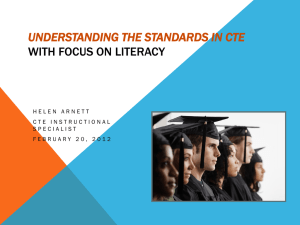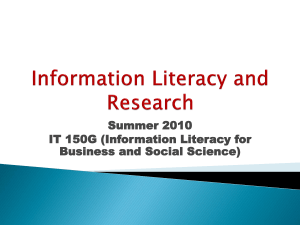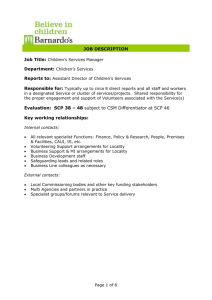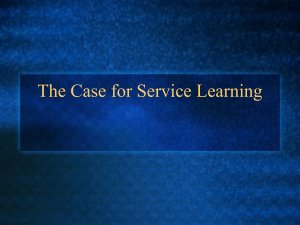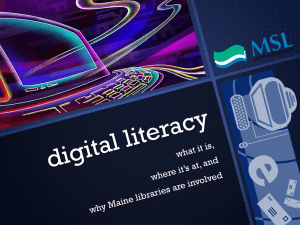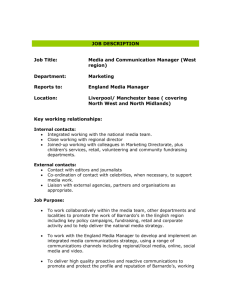Ready to Learn Literacy Programme
advertisement
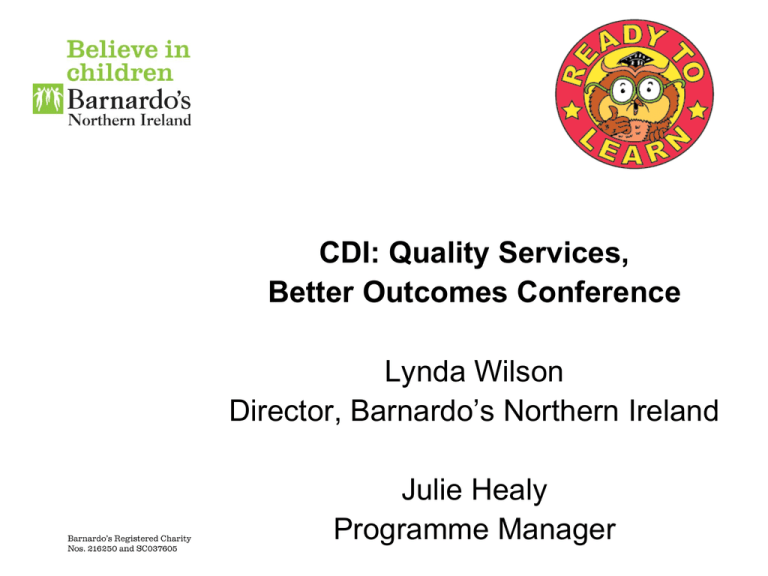
CDI: Quality Services, Better Outcomes Conference Lynda Wilson Director, Barnardo’s Northern Ireland Julie Healy Programme Manager Workshop Plan •Context (Barnardo’s & External Environment) •Outline of Ready to Learn After School Programme •Systems to ensure & monitor quality implementation •Lessons learned and future challenges HISTORY 1867 Founded by Thomas John Barnardo – Ragged school in the East End. 1870 Opened First Boys Home in Stepney Causeway Barnardo’s NI established in 1899 a soup kitchen in Great Victoria Street, Belfast Thomas John Barnardo 1845 - 1905 KEY FACTS BARNARDO’S N.I. 44 Services Practice development activity Research and dissemination Policy influence and lobbying Almost 600 staff £12.1.m annual budget £2.1m voluntary funds investment “We are doing good work but we need to do more to evidence and ensure that our work is doing good” External Environment •Tough economic conditions •Cuts to public expenditure likely to impact on services for children •Commissioners increasingly seeking evidence based / proven programmes •Early intervention firmly on ‘agenda’ but strategy for moving forward? Internal Environment •Organisational readiness and history of promoting evidence based practice •Move from ‘standards’ towards outcomes and effectiveness but ….. •Strong background in social work •Traditional structure & hierarchy •Culture of management & compliance Ready to Learn A school based programme working in partnership with schools and families to raise children’s achievement Focus on improving children’s literacy skills and facilitating parental involvement in child’s education Two components •After School programme to promote the skills and development needed to achieve in school •Range of information & activities for parents to help them support their child’s learning Why literacy? •NI has a much praised education system •NI GCSE results at Grade C or above were 9% higher than England or Wales, NI also does significantly better at A Level •32% of children in working class areas in NI go to University, higher than children from similar areas in England •Pockets of severe underachievement which is linked to a range of negative outcomes as children and in adulthood •One-fifth of children leave Primary School without reaching the expected level in literacy •NI Audit Office - £40 million on improving literacy with little impact Service Design No existing programme to replicate to achieve our outcome •Ready to Learn seeks to reinforce and consolidate the work in school by working directly with parents and children •Specific link to the NI Curriculum After School Programme Ready to Learn aims to increase educational achievement by providing a literacy rich after school programme to all children who are eligible. •The After School Club runs on Tuesday, Wednesday and Thursday afternoons from 2pm-3pm when the school is open. •All Primary 2 children in participating schools are eligible to attend (300 +). 2 core elements 1. An academic programme aimed at enhancing literacy achievement (explicit outcome) 2. A social programme incorporating social, emotional and behavioural regulation skills (implicit outcome) Literacy rich activities Strand 1 -Attention and Listening Strand 2 -Phonological awareness Strand 3 -Oral language Strand 4 -Vocabulary Strand 5-Concepts of print Quality Drivers Within Ready to Learn •Context of a randomised controlled trial •High expectations from schools, funders and policy makers •Conscious of potential for future ‘product’ development (not just service delivery) Quality measures Within Ready to Learn •Service Design •Specific Job Descriptions •Rigorous recruitment & selection •Induction & ongoing training •Regular supervision •Manualised programme •Observation •Weekly recording by Leaders •Feedback from Schools & IAC •Team meetings •Process review Implementation Goal Performance Assessment Systems Intervention Coaching Facilitative Administration Training Core Implementation Components Selection Decision Support Data System Leadership Technical Adaptive 34 Source: Slides presented at Implementation Masterclass, Dublin, May 2011, Karen Blasé and Dean Fixsen Lessons Learned & Future Challenges •Need for a ‘facilitative’ environment •Move from ‘supervision model’ to coaching and implementation fidelity •Performance assessment – different management style •Do we have an effective implementation infrastructure?



